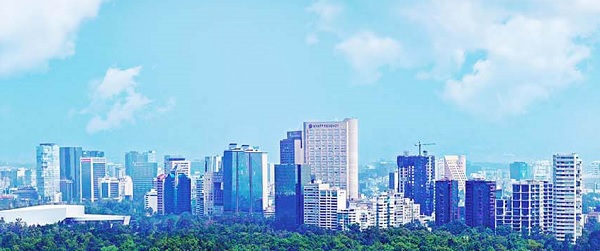House prices rose by 4.58% y-o-y in 2019
Mexico’s housing market continues to strengthen, despite ailing economy. The nationwide house price index rose by 4.58% during 2019, the biggest y-o-y increase since 2016. On a quarterly basis, house prices fell slightly by 0.27% during the latest quarter.
For a decade the housing market has hardly moved. In 2009, house prices rose 0.77% (inflation-adjusted), in 2010 it fell 0.59%, in 2011 + 2.37%, in 2012 -1.15%, in 2013 + 0.39%, in 2014 + 0.84%, in 2015 + 4.36%, in 2016 + 4.07%, and in 2017 +0.73%, all inflation-adjusted. In 2018, house prices increased robustly by 4.32%.

Luxury market buoyed by both foreign and domestic demand. Mexico’s real estate market has been buoyed by strong demand in resort communities, according to the International Consortium of Real Estate Associations (ICREA). American and Canadian buyers are returning to Mexico, after a several-year slump, thanks to low oil prices and the strong US dollar, pushing home values up.
Mexico’s rising middle class continues to boost the housing market. The country’s middle class was estimated to account for almost half of the total households, at 14.6 million. They are expected to continue growing, with about 3.8 million more households projected to move into the middle class by 2030.
Rents, rental yields: moderate yields at 4.9% to 5.4%
Mexico City apartment costs are reasonable at around $3,000 per sq. m.
| Mexico: typical city centre apartment buying price, monthly rent (120 sq. m) | |||
| Buying price | Rate per month | Yield | |
| Mexico City | $350,000 | $1,500 | 5.2% |
Recent news. In February 2020, the central bank Banco de Mexico (Banxico) cut its key rate by 25 basis points to 7%, the fifth consecutive rate cut in six months, amidst slowing inflation and sluggish economic growth.
The Mexican economy shrank by 0.1% in 2019 from a year earlier, following a 2.1% growth in 2018, amidst weak services sector and a decline in industrial activity, which relies heavily on US demand, according to the according to the National Institute of Statistics and Geography (INEGI). In fact, it was the economy’s weakest performance in a decade.
President Andres Manuel Lopez Obrador, widely known as AMLO, has alarmed investors since taking office on December 1, 2018 by vowing to transform the country’s “neoliberal” economic model and terminating a new US$13-billion airport for Mexico City that was already one-third complete. His abrupt decision to cancel the project sparked a sell-off in Mexican financial assets.
The International Monetary Fund (IMF) recently cut Mexico’s GDP growth forecast to just 1% this year, a reduction from its earlier projection of 1.3% expansion.